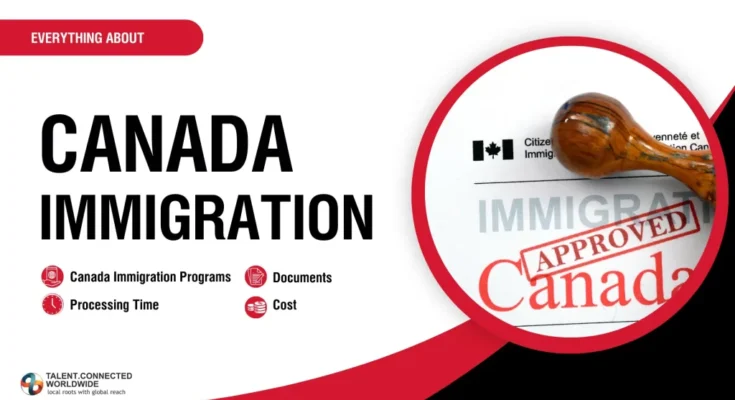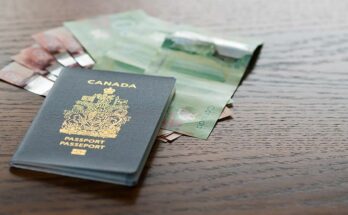Canada has long been a preferred destination for immigrants worldwide, offering a high quality of life, strong economy, and cultural diversity. Obtaining Permanent Residency (PR) in Canada is a significant milestone for those seeking long-term settlement and citizenship. Visa sponsorship programs add another pathway for individuals to fulfill their Canadian dream by allowing family members or employers to support their applications.
Whether you’re planning to apply for PR through Express Entry, a Provincial Nominee Program (PNP), or family sponsorship, understanding the processing times and requirements is crucial.
Let’s dive into the details to guide you through Canada’s PR processing journey.
What Is Canadian Permanent Residency (PR)?
Canadian PR status allows immigrants to live, work, or study anywhere in Canada while enjoying many benefits. PR holders can access healthcare, social benefits, and pathways to citizenship after three years of residence. However, they must renew their PR card every five years and maintain their residency obligation by staying in Canada for at least 730 days during this period.
Key Benefits of PR:
- Free healthcare and education.
- Social security benefits.
- Right to sponsor eligible family members.
- Path to Canadian citizenship.
Holding PR status is not the same as being a Canadian citizen. PR holders cannot vote or hold certain public office positions, but they enjoy many rights and opportunities.
Visa Sponsorship in Canada
Visa sponsorship allows Canadian citizens or PR holders to support the immigration application of eligible family members. Employers can also sponsor foreign workers under specific circumstances.
Types of Visa Sponsorship Programs:
- Family Sponsorship: Spouses, children, parents, and grandparents.
- Employer Sponsorship: Temporary Foreign Worker Program (TFWP) and Global Talent Stream.
- Refugee Sponsorship: Support for individuals seeking asylum in Canada.
Sponsorship programs play a vital role in reuniting families and addressing labor shortages in the country.
Canada PR Processing Time Overview
PR processing times in Canada vary depending on the immigration program, the applicant’s country of origin, and the complexity of the application. The Immigration, Refugees, and Citizenship Canada (IRCC) regularly updates its processing times to reflect the current workload.
Key Factors Affecting Processing Times:
- Type of PR program (Express Entry, PNP, Family Sponsorship, etc.).
- Completeness of the application.
- Background checks, security screenings, and medical examinations.
- Volume of applications received by IRCC.
Express Entry Processing Time
The Express Entry system is the fastest route to Canadian PR for skilled workers. It manages applications under three programs: Federal Skilled Worker Program (FSWP), Canadian Experience Class (CEC), and Federal Skilled Trades Program (FSTP).
Average Processing Time:
- IRCC aims to process Express Entry applications within 6 months for most applicants.
How to Speed Up Express Entry Processing:
- Ensure your Express Entry profile is complete and accurate.
- Submit required documents promptly.
- Improve your Comprehensive Ranking System (CRS) score by enhancing your language skills or gaining additional work experience.
Family Sponsorship Processing Time
Family sponsorship programs enable Canadians to reunite with their loved ones. However, the processing time varies depending on the relationship and location of the sponsored person.
Average Processing Times:
- Spouses and Partners: 12 months.
- Parents and Grandparents: 20–24 months.
- Dependent Children: 6–12 months.
The IRCC often prioritizes spousal and child sponsorship applications to minimize family separation.
Provincial Nominee Program (PNP) Processing Time
PNPs allow Canadian provinces to nominate immigrants for PR based on their skills and economic contribution. Each province sets its criteria and processing timelines.
Typical Processing Time:
- PNP application processing takes 15–19 months, depending on the province and stream.
Applicants with a nomination under Express Entry-linked streams can expect faster processing.
Atlantic Immigration Program Processing Time
The Atlantic Immigration Program (AIP) addresses labor shortages in Canada’s Atlantic provinces: New Brunswick, Newfoundland and Labrador, Nova Scotia, and Prince Edward Island.
Processing Time:
- AIP applications are typically processed within 12 months.
Eligible candidates must secure a job offer from a designated employer and meet the language and educational requirements.
Business Immigration Processing Time
Business immigration programs cater to entrepreneurs, investors, and self-employed individuals who contribute to Canada’s economy.
Average Processing Time:
- Business immigration applications can take 1–3 years, depending on the program and province.
Applicants often need to provide extensive documentation, including business plans and proof of funds, which can slow down the process.
Factors That Impact PR Processing Time
The processing time for a Canada PR application can vary widely depending on several factors. While IRCC provides estimated timelines for different programs, these are often influenced by real-world circumstances. Understanding these factors can help you anticipate delays and plan accordingly.
1. Completeness of the Application:
One of the most common reasons for delays is submitting an incomplete application. Missing documents, unclear scans, or errors in the application form can lead to significant setbacks. IRCC may return incomplete applications or request additional information, which adds weeks or months to the process.
2. Background Checks:
IRCC conducts thorough background checks on every applicant to ensure they meet security and admissibility requirements. This includes verifying employment history, education credentials, and criminal records. If discrepancies are found or if additional verification is needed, the processing time may increase.
3. Medical Exams:
Every PR applicant must undergo a medical examination to prove they are not a health risk to Canadians. If health issues are flagged, the case may require further review, delaying the process.
4. High Volume of Applications:
During peak immigration periods, IRCC may face a backlog of applications. This is especially common for popular streams like Express Entry and family sponsorship.
5. Country of Residence:
Applicants from certain countries may experience longer wait times due to additional security screenings or limited IRCC resources in their region.
How to Reduce Canada PR Processing Time
Although some factors influencing PR processing are beyond your control, there are steps you can take to minimize delays. Here are some tips to streamline your application process:
1. Submit a Complete Application:
Carefully review IRCC’s document checklist and ensure all required forms and supporting documents are included. Double-check that all information is accurate and consistent across documents.
2. Respond Promptly to Requests:
If IRCC requests additional documents or information, respond as quickly as possible to avoid prolonged processing times.
3. Use Online Tools:
Submitting your application through IRCC’s online portal is typically faster than mailing physical documents. The online system also allows you to track the status of your application.
4. Improve Your CRS Score:
For Express Entry applicants, improving your Comprehensive Ranking System (CRS) score can lead to faster Invitations to Apply (ITAs). You can do this by retaking language tests, gaining additional work experience, or securing a job offer.
5. Hire an Immigration Consultant:
Professional immigration consultants or lawyers can help you navigate complex requirements, avoid mistakes, and prepare a strong application.
Current Canada PR Processing Times in 2025
As of 2025, IRCC has been working to streamline the PR application process and reduce delays. However, processing times still vary based on the immigration program and the applicant’s individual circumstances. Here’s an overview of the latest trends:
- Express Entry: 6 months or less for most applicants.
- Family Sponsorship: 12–24 months, depending on the relationship.
- Provincial Nominee Program (PNP): 15–19 months on average.
- Atlantic Immigration Program (AIP): Around 12 months.
- Business Immigration: 1–3 years, depending on the complexity of the case.
It’s worth checking the official IRCC website regularly for the most up-to-date information.
Tips for a Smooth PR Application Process
Navigating the PR application process can feel overwhelming, but following these tips can make the journey much smoother:
1. Start Early:
Begin gathering documents and preparing your application well in advance. Delays often occur when applicants rush through the process and miss critical details.
2. Stay Organized:
Create a checklist to ensure you don’t forget any essential documents. Label files clearly and keep both digital and physical copies for reference.
3. Understand Program Requirements:
Each PR program has unique eligibility criteria. Familiarize yourself with these requirements to ensure you meet all qualifications before applying.
4. Avoid Common Mistakes:
Errors such as misspelled names, incorrect dates, or outdated forms can lead to rejection or delays. Proofread your application multiple times or have someone else review it for accuracy.
5. Keep Track of Deadlines:
Submit your application before program deadlines and respond to IRCC’s requests promptly. Missing deadlines can result in application refusal.
Challenges Faced During Canada PR Processing
Despite your best efforts, you may encounter challenges during the PR application process. Here are some common issues and how to address them:
1. Delays in Background Checks:
Lengthy security or employment verifications can slow down your application. To avoid this, provide clear and verifiable information in your application.
2. Document Verification Issues:
If IRCC cannot verify the authenticity of your documents, they may request additional evidence, causing delays. Always submit certified translations and notarized copies when required.
3. Miscommunication with IRCC:
Applicants sometimes miss critical updates from IRCC. Regularly check your email and the online application portal for any new messages.
4. Application Refusals:
In some cases, applications are refused due to incomplete information or failure to meet eligibility criteria. If this happens, you may need to reapply or file an appeal.
Conclusion
Canada’s PR application process is a vital step for those looking to build a future in one of the world’s most welcoming countries. While processing times can vary, understanding the factors involved and taking proactive steps can help you navigate the process smoothly. Whether you’re applying through Express Entry, family sponsorship, or a provincial program, staying informed and prepared is key to achieving your dream of becoming a Canadian permanent resident.



